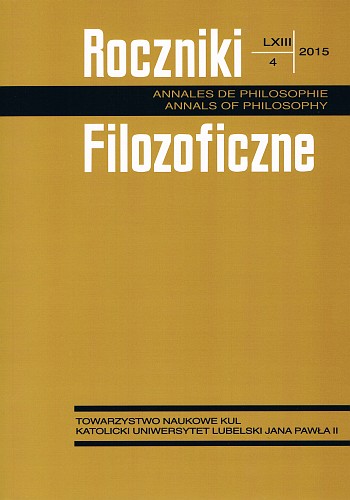Oświeceniowa kultura naukowa w kontekście filozoficznym. Z dziejów Komisji Edukacji Narodowej (cz. 1)
Learned Culture in the Enlightenment in the Philosophical Context: On the History of the Commission of National Education (Part One)
Author(s): Stanisław JaneczekSubject(s): Philosophy
Published by: Towarzystwo Naukowe KUL & Katolicki Uniwersytet Lubelski Jana Pawła II
Keywords: Commission of National Education;Polish–Lithuanian Commonwealth;Age of Enlightenment;History of Education;History of Philosophy;History of Science;
Summary/Abstract: This paper depicts the didactic approach of the Commission of National Education (Pol. KEN). It focuses on the educational reforms characteristic of the Age of the Enlightenment. In particular, it shows the specific character of the then philosophy and modern science that gradually liberated itself from the hegemony of philosophy. It pinpoints the spirit of utilitarianism that dominated at that time, and in its methodological aspect policy eclecticism. This attitude was manifested throughout European education, therefore not only in France, which was leading at least in her policy declarations, but especially in the Habsburg monarchy whose education was under centralistic reformation. It was also proper to the then learned culture of the Encyclopaedia, or a Systematic Dictionary of the Sciences, Arts, and Crafts, on which the KEN would draw. The European school of linguistic and humanistic studies was enriched by mathematics and natural sciences, whereas a course in philosophy in the spirit of philosophia recentiorum was maintained, at least at the university level. This philosophy assimilated some elements of modern epistemology in a critical manner, especially the accomplishments of modern natural science. Such approach was typical of reformed education in the Polish–Lithuanian Commonwealth by religious milieus, especially the Piarists and Jesuits. In the course of time empiristic epistemology became more and more popular and bore fruit in the form of phenomenalism which questioned the pursuit of philosophy maximalistically understood in the form of modern Christian Aristotelianism in the traditional school. Despite criticism of this model of education, the pressure of the so-called long duration (longue durée) accounts for the maintenance of philosophical elements in Enlightenment school, even in natural science, in the form of interpretation that takes advantage of the category of substance and its properties, and even of the conception of animal soul.
Journal: Roczniki Filozoficzne
- Issue Year: 63/2015
- Issue No: 4
- Page Range: 35-65
- Page Count: 31
- Language: Polish

